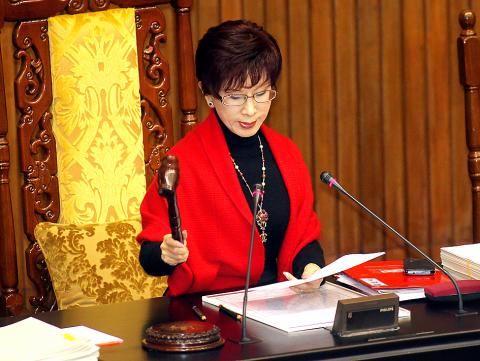Foreigners with HIV are no longer banned from entering, staying or residing in the nation, after amendments to the HIV Infection Control and Patient Rights Protection Act (人類免疫缺乏病毒傳染防治及感染者權益保障條例) were passed yesterday by the legislature.
The amendments include the removal of Article 18, which stipulated that people of foreign nationalities were subject to a request for a recent HIV test report if they wished to remain in the nation for more than three months and could be deported or have their visas and permits annulled if the test result was positive.
Chinese Nationalist Party (KMT) Legislator Yang Yu-hsin (楊玉欣) said that the UN has long argued that there is no evidence that restrictions on entry, stay and residence of HIV-positive people protect public health and “there are only 28 countries left with such restrictions on people living with HIV.”

Photo: CNA
Democratic Progressive Party Legislator Chao Tien-lin (趙天麟) and other lawmakers who proposed the amendments said that to move in line with the global trend on human rights protection, “there is no reason to impose restrictions, particularly on people with HIV.”
The US, South Korea and China have removed similar restrictions in recent years, the lawmakers added.
Another change to the law is the inclusion of an additional clause to Article 15 — in which it is stated that medical personnel “shall only collect blood of the individuals for HIV testing upon gaining the consent of the individuals concerned after going through counseling procedures” — that allows the collection and testing of certain groups of people without their or their legal representatives’ consent.
The designated groups include medical personnel and emergency response personnel, who are exposed to the risk of HIV infection in their work by coming into contact with blood and bodily fluids, individuals who have fallen unconscious and infants born to unidentified mothers.
The revised act also stipulates that the National Health Insurance (NHI) system will cover the costs of the medical treatment of people with HIV after two years of medications provided by the competent authority, which is the Ministry of Health and Welfare’s Centers for Disease Control (CDC).
The CDC will continue to partially shoulder the medical costs that are not covered by the NHI after two years of adherence to therapy to make sure that the patients do not unilaterally terminate the treatment out of financial concerns, Yang said.

‘DANGEROUS GAME’: Legislative Yuan budget cuts have already become a point of discussion for Democrats and Republicans in Washington, Elbridge Colby said Taiwan’s fall to China “would be a disaster for American interests” and Taipei must raise defense spending to deter Beijing, US President Donald Trump’s pick to lead Pentagon policy, Elbridge Colby, said on Tuesday during his US Senate confirmation hearing. The nominee for US undersecretary of defense for policy told the Armed Services Committee that Washington needs to motivate Taiwan to avoid a conflict with China and that he is “profoundly disturbed” about its perceived reluctance to raise defense spending closer to 10 percent of GDP. Colby, a China hawk who also served in the Pentagon in Trump’s first team,

SEPARATE: The MAC rebutted Beijing’s claim that Taiwan is China’s province, asserting that UN Resolution 2758 neither mentions Taiwan nor grants the PRC authority over it The “status quo” of democratic Taiwan and autocratic China not belonging to each other has long been recognized by the international community, the Mainland Affairs Council (MAC) said yesterday in its rebuttal of Beijing’s claim that Taiwan can only be represented in the UN as “Taiwan, Province of China.” Chinese Minister of Foreign Affairs Wang Yi (王毅) yesterday at a news conference of the third session at the 14th National People’s Congress said that Taiwan can only be referred to as “Taiwan, Province of China” at the UN. Taiwan is an inseparable part of Chinese territory, which is not only history but

CROSSED A LINE: While entertainers working in China have made pro-China statements before, this time it seriously affected the nation’s security and interests, a source said The Mainland Affairs Council (MAC) late on Saturday night condemned the comments of Taiwanese entertainers who reposted Chinese statements denigrating Taiwan’s sovereignty. The nation’s cross-strait affairs authority issued the statement after several Taiwanese entertainers, including Patty Hou (侯佩岑), Ouyang Nana (歐陽娜娜) and Michelle Chen (陳妍希), on Friday and Saturday shared on their respective Sina Weibo (微博) accounts a post by state broadcaster China Central Television. The post showed an image of a map of Taiwan along with the five stars of the Chinese flag, and the message: “Taiwan is never a country. It never was and never will be.” The post followed remarks

INVESTMENT WATCH: The US activity would not affect the firm’s investment in Taiwan, where 11 production lines would likely be completed this year, C.C. Wei said Investments by Taiwan Semiconductor Manufacturing Co (TSMC, 台積電) in the US should not be a cause for concern, but rather seen as the moment that the company and Taiwan stepped into the global spotlight, President William Lai (賴清德) told a news conference at the Presidential Office in Taipei yesterday alongside TSMC chairman and chief executive officer C.C. Wei (魏哲家). Wei and US President Donald Trump in Washington on Monday announced plans to invest US$100 billion in the US to build three advanced foundries, two packaging plants, and a research and development center, after Trump threatened to slap tariffs on chips made